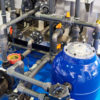When it comes to treating your pool to prevent the growth of bacteria, Pool Troopers wants you to know the options available, and just what is the difference between saltwater and chlorine treatment.
First, a saltwater pool historically used to mean a pool filled with sea or ocean water- many of which used to have direct piping to the open water. Some few pools still do! However, now the term refers to a pool using a Salt Chlorine Generator. The pool will have salt levels usually 1/10 to 1/8 the amount of salt in seawater.
Saltwater Pools
Saltwater pools do produce chlorine. It is created, not added to the water, by chemical electrolysis of the salt water generator.
What is a saltwater generator? It produces its own chlorine and reduces the need to add this chemical to the pool. Water goes to the salt chlorine generator after it has moved through the filtering system. It then moves between the plates in the cell, made of titanium, that are electrically charged. Due to a chemical reaction, pure chlorine is formed. The water then flows back into the pool to do the work of sanitizing and eliminating algae.
The treated water is less salty than that found in the ocean and will not harm grass or plants that are near the pool if spilled or splashed out.
Benefit: You will not have to buy and store chlorinating compounds to add to the pool. Salt is the primary material that will be added; the salt is what releases the chlorine as it passes through the generator. The pool water will get small amounts of chlorination daily rather than a large does once a week if you had added the actual chemical to the pool water. This results in a better swim experience while maintaining swim safe pool water. It is thought to be beneficial for hair and skin as well.
Chlorine Pools
Chlorine is a naturally occurring element and as a homeowner, you cannot add pure chlorine to your pool. Instead as part of the regular maintenance, you add chlorine through one or more chlorinating compounds.
Chlorinating compounds are very effective in killing bacteria and viruses that may be lurking in your pool. Routine testing is required to ensure that the water chemistry is safe. Pool Troopers can help you in testing and maintaining the correct pool water environment.
Saltwater generator:
Pros:
- Less daily chemicals
- Added salt
- Better for skin and health
- Kills bacteria and algae
Cons:
- More complex if problems
- Buying and carrying heavy bags of salt
Chlorine:
Pros:
- Kills bacteria and algae
- Safe to swim in
- Kills viruses
Cons:
- Chlorinated smell
- Dry skin
- Need to add and monitor frequently
- Storage of chemicals near kids
- May cause red eyes
Conclusion
Both types of pool chemicals have pros and cons. You might ask yourself what type of pool environment is best for you and your needs. How much effort do you want to put into maintaining your pool? There are good arguments for and against both types of pool chemistry solutions.
Pool Troopers can help in making sure that your pool water is safe and effective in killing germs, and the chemistry is the best one for the health of your family. Consider the needs of your family and budget, do the research and then make the best choice between the type of chlorination system that works best for you. Pool Troopers is here to answer any questions you may have; we can also give you the best of both of these systems.




